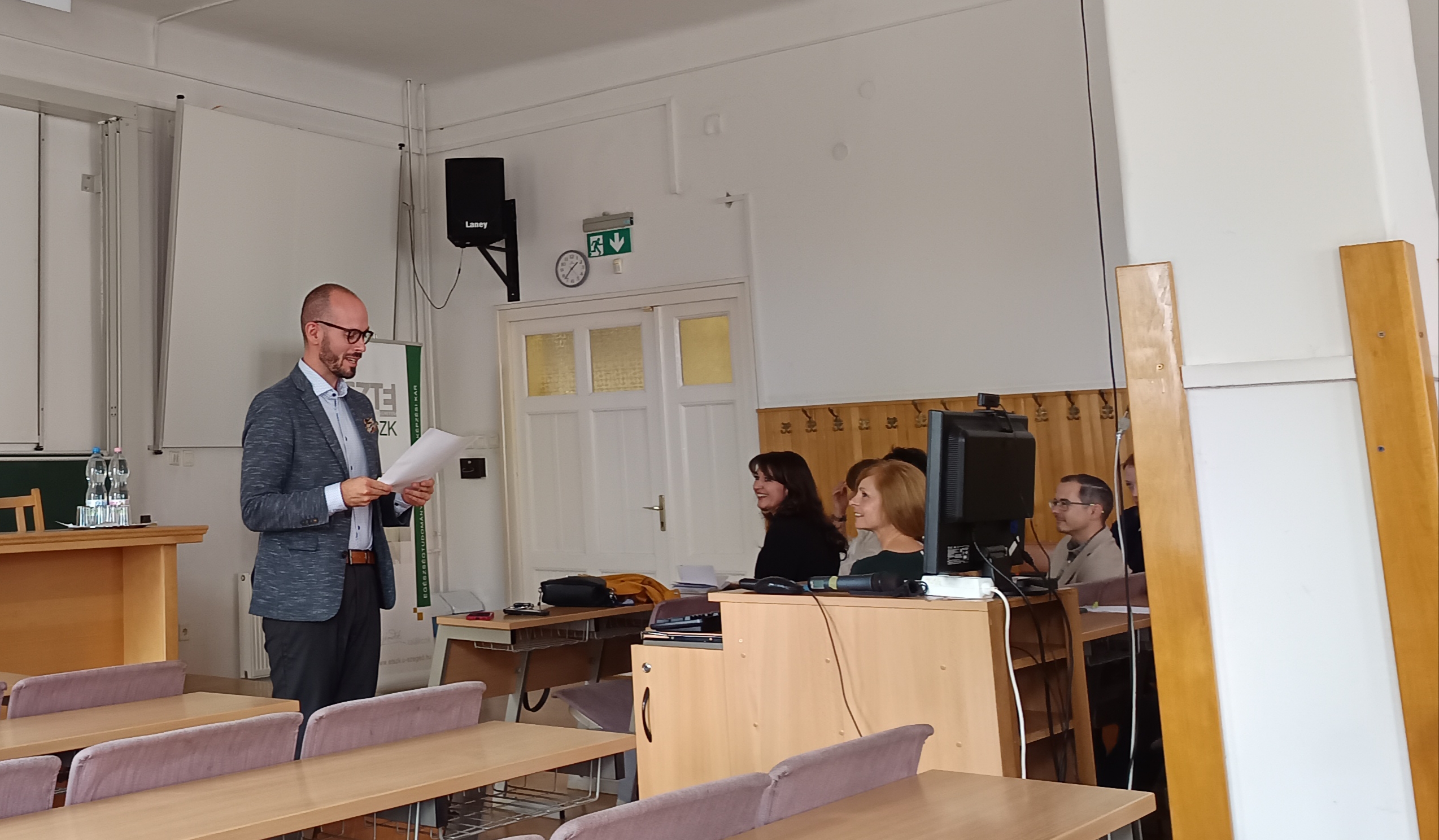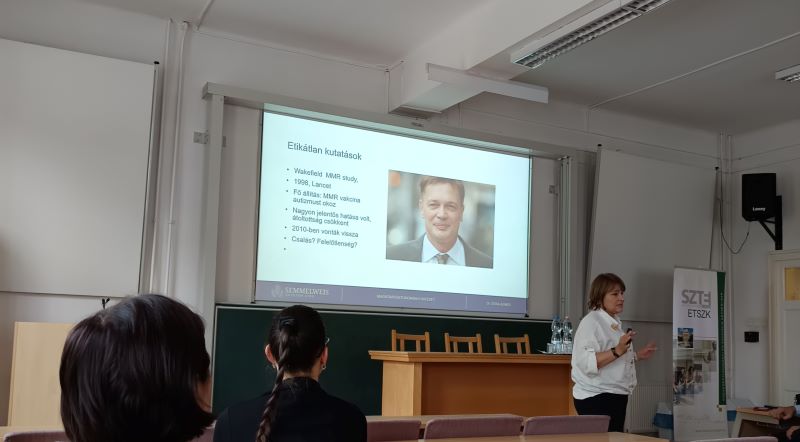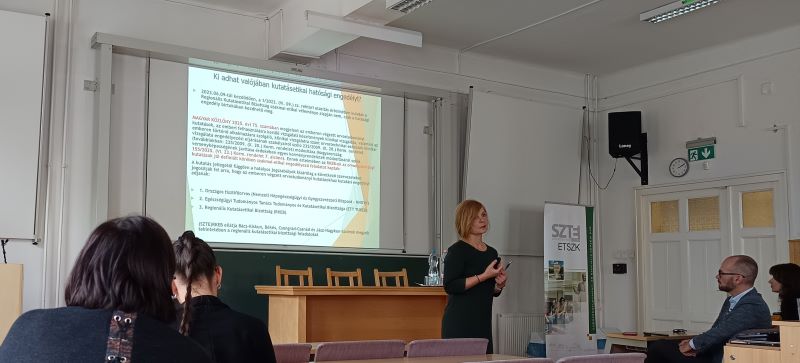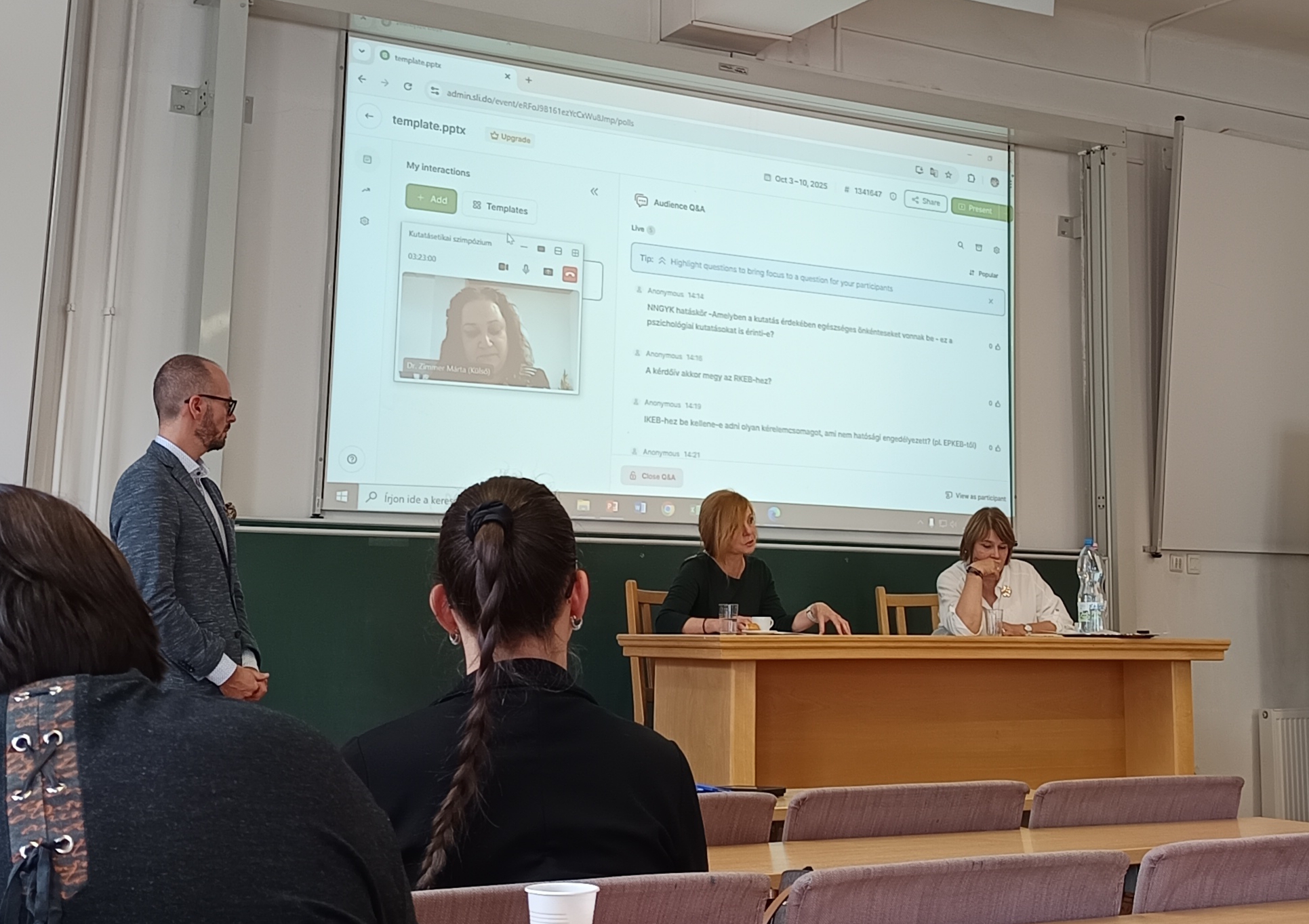A gap-filling symposium titled “Research Ethics Challenges in Students’ Scientific Work” was held on October 3 at the Faculty of Health Sciences and Social Studies (ETSZK) of the University of Szeged (SZTE). How can one be both scientific and ethical at the same time? The lectures and the subsequent discussions helped participants navigate the complex world of research ethics.
The event was organized by the Department of Nursing at SZTE ETSZK: Dr. Angelika Szatmári, Dr. Gergely Tari, and Dr. Edina Berta Héderné. According to Dr. Gergely Tari, a recurring question among instructors is how to guide research activities, theses, and Student Research Society (TDK) projects in a way that meets both scientific and ethical standards.
Already at the beginning of the event, it became clear that most of the audience had faced the challenge of not knowing where to submit their ethics approval request, or whether their study should be classified as an interventional or non-interventional research. Dr. Gegely Tari emphasized that the aim of the symposium was to clarify the procedures and responsibilities involved in the ethical approval process for biomedical research.

|
Dr. Gergely Tari, member of the Department of Nursing at our Faculty and the Institute of Behavioral Sciences at the aculty of Medicine (SZAOK, SZTE)
|
To guide participants through this process, three invited experts gave presentations: Dr. Ágnes Dósa, researcher at the Institute of Behavioural Sciences, Semmelweis University; Dr. Márta Zimmer (Budapest University of Technology and Economics), member of the Unified Psychological Research Ethics Committee (EPKEB); and Dr. Andrea Domján, lecturer at the Department of Physiotherapy, SZTE ETSZK, and member of the Regional and Institutional Research Ethics Committees (RKEB/IKEB) at SZTE. The event was officially opened by Prof. Dr. Edit Tóth-Molnár, Dean of the Faculty.
In her opening lecture, Dr. Ágnes Dósa presented the evolution of legislation governing research involving human participants over the past 30 years.
She highlighted that three types of interests often collide in research: individual interest (patients wanting the best available therapy), social interest (advancing medical science), and the researcher’s interest (the pressure to publish). These interests must somehow be reconciled. While outlining the history of research ethics, Dr. Ágnes Dósa mentioned several unethical studies—for example, a 1967 sugar industry-funded study that falsely downplayed the cardiovascular risks of sugar compared to saturated fats, and the infamous Tuskegee syphilis study of the 1970s, where impoverished African-American participants were denied treatment. These examples, she argued, clearly demonstrate the need for strict ethical regulation.
Dr. Ágnes Dósa also explained that while there has long been a regulated pathway for approving new pharmaceuticals, these regulations were initially less stringent until Hungary’s accession to the European Union. This introduced a significant legal overhaul, ensuring that studies had to meet both scientific and legal standards. From that point on, interventional studies came under the jurisdiction of the Scientific and Research Ethics Committee of the Health Science Council (ETT TUKEB). In 2007, the category of non-interventional studies (BNV) was introduced, with simplified procedures. However, applying administrative law to these cases caused delays—sometimes up to six months. As of June 2025, however, an interim regulation has simplified this process, making ethical approval more transparent and researcher-friendly.
 |
| Dr. Ágnes Dósa (Semmelweis University) |
The second presentation, delivered online by Dr. Márta Zimmer, was titled “Interdisciplinary Research – Interdisciplinary Approval? Ethical Licensing of Human Psychological Studies.” She introduced the work of the Unified Psychological Research Ethics Committee (EPKEB), founded in 2009 to ensure objective, cross-institutional evaluation of psychological research proposals.
Initially formed by a few key institutions (including the DE, MTA-PKI, PTE-PI, SZTE-PI, CEU), the model has now expanded to nearly 20 institutions.
Dr. Márta Zimmer explained that member institutions and delegated committee members are elected based on their CVs, as are the two annually rotating co-chairs—ensuring that no chair can review proposals from their own institution. Any lecturer, researcher, or student from a participating institution may initiate an ethical review. If the applicant does not hold a scientific degree, they must name a supervising researcher. Applications are submitted online via the institutional liaison and are reviewed by two evaluators; in case of disagreement or rejection, the full committee discusses the case.
She also raised several ethical dilemmas, such as whether a sports academy can access children’s data with parental consent when the Hungarian Psychological Association’s Code of Ethics prescribes strict confidentiality.Dr. Zimmer noted that EPKEB only accepts student submissions if the research has the potential to lead to an international publication; otherwise, approval should be sought through the institutional ethics committee.
The third lecture, delivered by Dr. Andrea Domján and titled “Beyond the Maze – The Structure, Changes, and Future of Research Ethics Procedures in Hungary,” began with a warning: “Do not ask ChatGPT whether your research requires ethical approval—it won’t give you the correct answer.” She clarified who can actually issue an official ethical research permit. According to an amendment to a government decree in 2025, Regional Research Ethics Committees (RKEB) have now been granted the authority to issue professional-ethical approvals within well-defined areas of medical sciences. Ethical approval for biomedical research involving human participants may also be granted by the National Chief Medical Officer and ETT TUKEB.
If a study deviates from standard diagnostic or therapeutic protocols—that is, if it involves intervention—the only body authorized to grant approval is the National Public Health and Pharmaceutical Center (NNGYK) under the Chief Medical Officer. Dr. Domján illustrated this with examples: following existing treatment protocols or conducting preventive studies with healthy participants are non-interventional, while studies involving physical exertion, saliva or skin sampling, or dividing participants into multiple groups are interventional.By contrast, retrospective case-control and other observational studies, as well as anonymized questionnaire-based or medical record analyses, are non-interventional.
 |
| Dr. Andrea Domján, member of the Department of Physiotherapy at our Faculty, and member of the Regional and Institutional Research Ethics Committees of SZTE. |
She then introduced the SZTE Regional Research Ethics Committee (RKEB), of which she is a member. The committee is responsible for approving non-interventional studies within its jurisdiction, with a few exceptions such as drug trials or research involving embryos, stem cells, or gametes. If a study spans multiple RKEB regions, it falls under the jurisdiction of ETT TUKEB. The Institutional Research Ethics Committee (IKEB) handles institutional acceptance following official approval—required only if the permit did not originate from the SZTE RKEB. These permits must be accompanied by regular progress reports. Dr. Andrea Domján also presented the list of required documents for RKEB applications, to be submitted to
office.rkeb@med.u-szeged.hu, and assured attendees that her presentation slides would be made available.
Following the three presentations, the speakers and audience engaged in an open discussion, addressing questions and sharing insights.
Helga Balog



